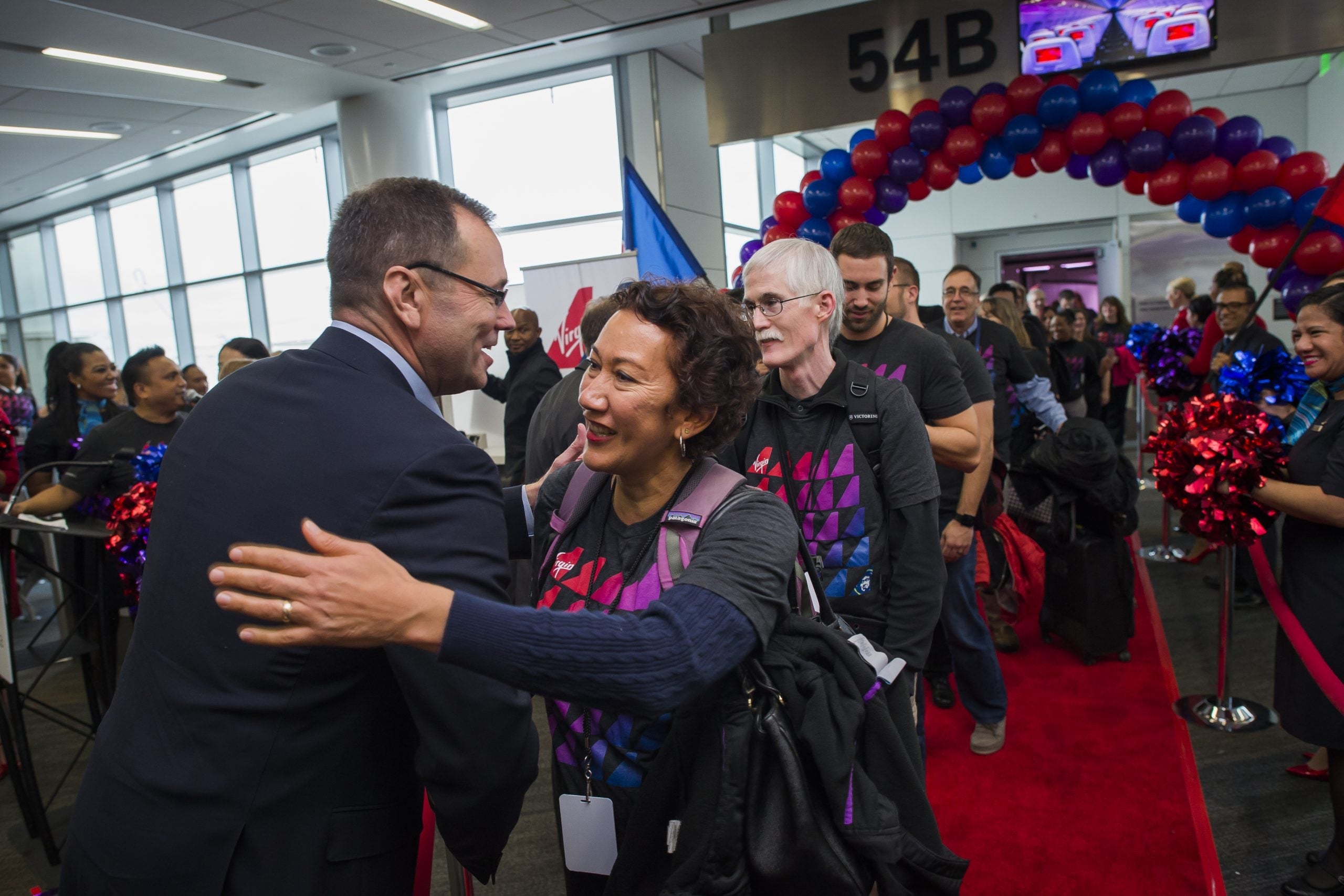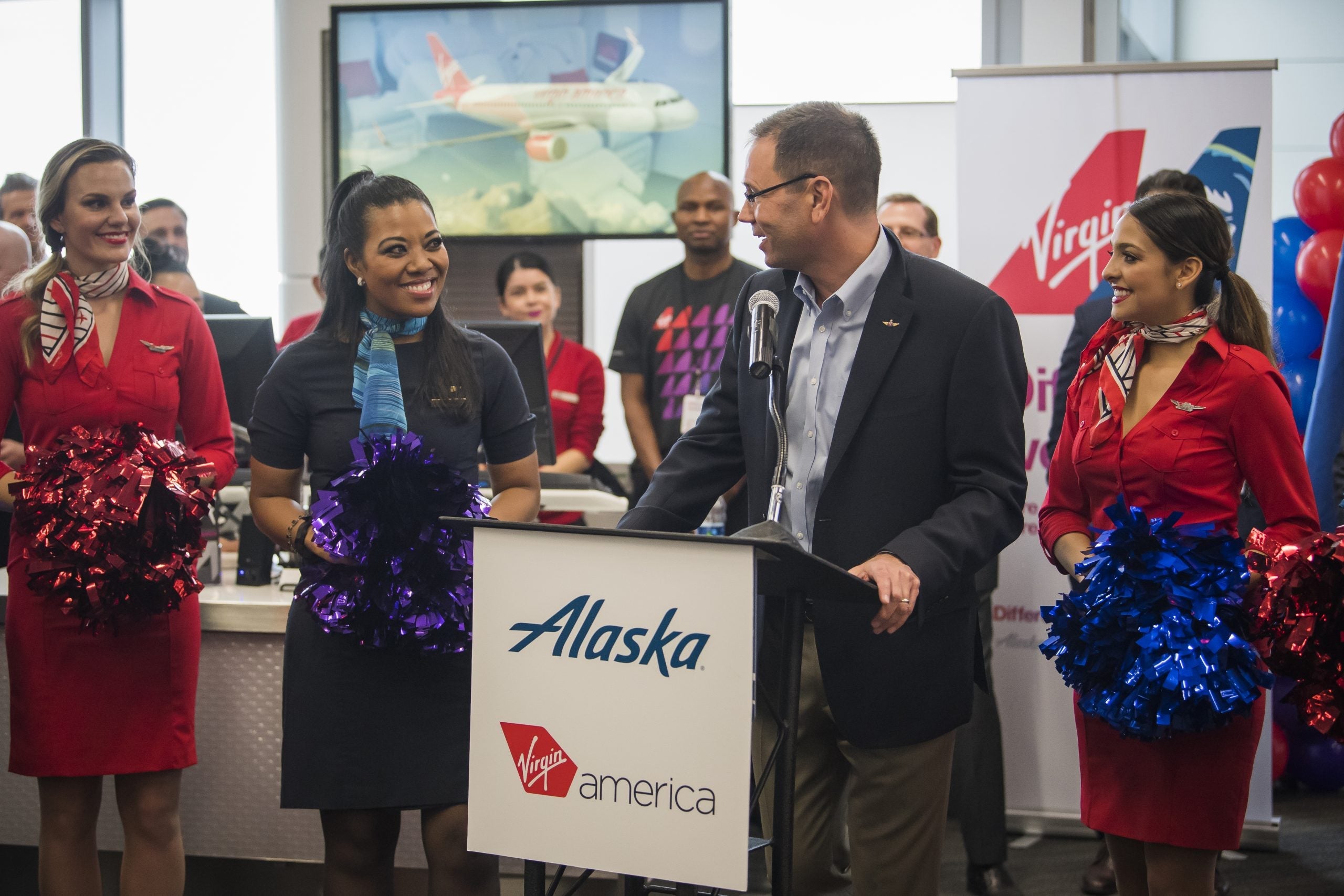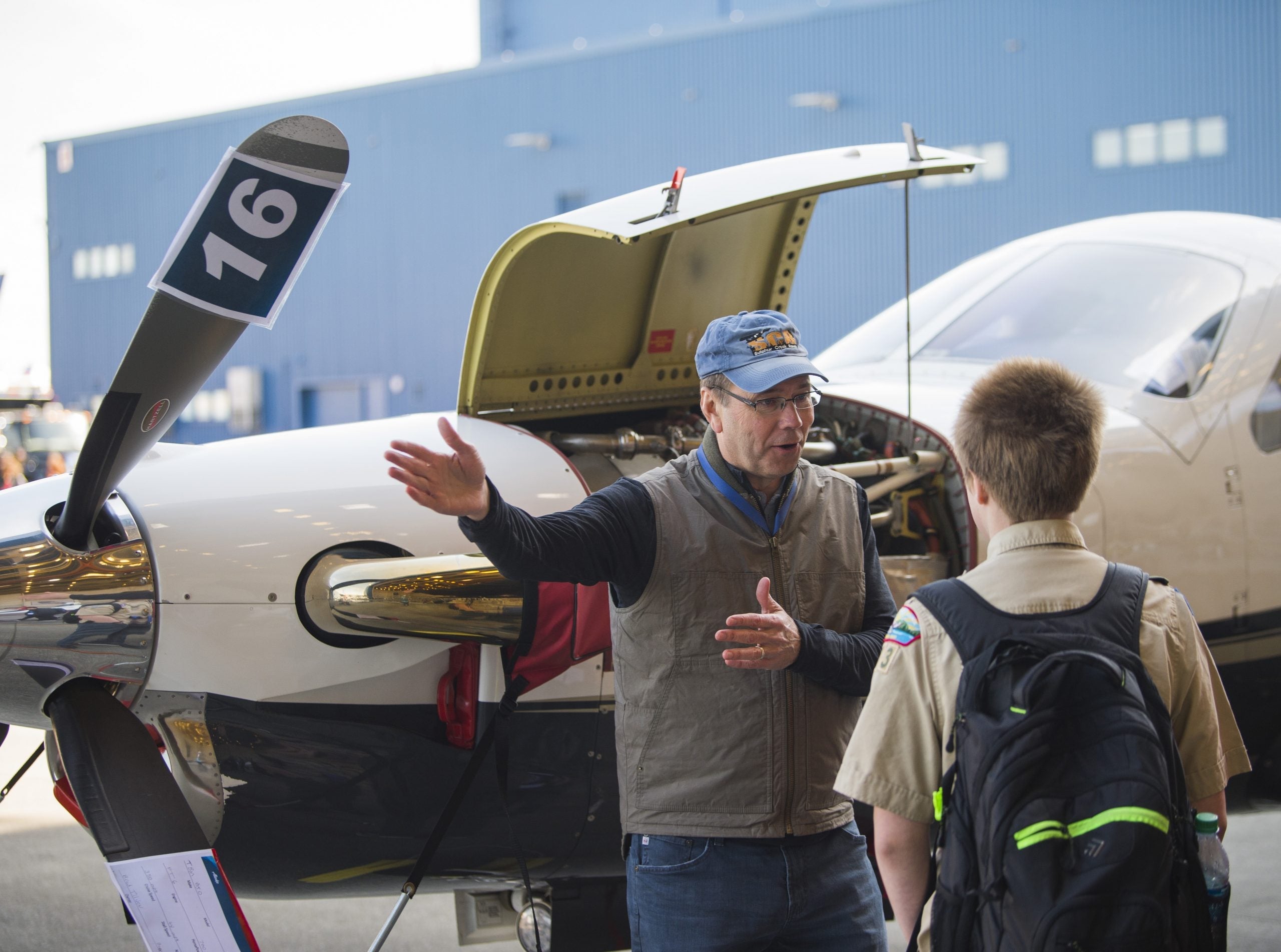From battling 'frenemy' Delta to Oneworld to Virgin America, outgoing Alaska Air CEO leaves his mark
Brad Tilden needed a few seconds to compose himself.
He had been answering questions for almost an hour, but it was one question near the end that left the Alaska Airlines CEO choked up.
"What will you miss the most once you turn over the keys?"
Tilden began to answer before pausing. It was brief, just a few seconds, but the emotions were palpable. Then Tilden continued, regaining control during one of his last interviews before he steps down as Alaska's top executive.
That will come next Wednesday (March 31), when the 60-year-old Tilden will retire — kicking off a new era for the Seattle-based airline that has cemented its position under his leadership as the nation's fifth-largest airline.
Ben Minicucci, currently Alaska Airlines' president and the company's No. 2 executive, will ascend to the role of CEO. But it's more than just a change in the corner office.
On that same day, Alaska will officially celebrate one of the biggest changes in its history. It will join the Oneworld frequent flyer alliance as part of a renewed strategic partnership with American Airlines.
The change is a momentous one for Alaska, ending its decades-long run as an "unaligned" carrier that has bucked broader partnership trends. It's just the latest of several major developments under Tilden's watch that will help shape the carrier's trajectory for years to come.
Loyalty shake-up: American, Alaska Airlines outline reciprocal elite benefits, upgrades

Among the others: Alaska's 2016 acquisition and subsequent assimilation of Virgin America, repelling an assault by partner-turned-rival Delta, and a major expansion of service to Hawaii and the East Coast. There's also the December order for at least 68 Boeing 737 MAXes that will keep the airline tethered to the behemoth jetmaker that has its own long history in the Seattle area.
And now there's the COVID-19 crisis that's handed the airline industry its biggest challenge in history. In April of 2020, air traffic had plunged by 90% and the future of all U.S. airlines was in question.

Now, only a year after the pandemic wreaked havoc on airlines around the world, Tilden says he can see light at the end of the tunnel. Demand is ticking up, with travelers showing more optimism about taking to the skies — especially to outdoor destinations — as the nation's vaccination effort hits full stride.
"Alaska is cash flow positive this month," Tilden said in his interview with TPG last week at the company's Seattle-area headquarters. "I think we're going to have a good summer in 2021, and I would say a pretty normal summer in 2022."
Tilden – who exudes a laid-back, aw-shucks demeanor – is also quick to point out the pandemic's unpredictably. Still, he says he's optimistic – suggesting overall profitability could even return as early as next year.
That will be Tilden's most immediate legacy as Alaska's outgoing CEO.
"I think that one of the things that matters most is he kept Alaska going through the worst business crisis to hit the airline industry in peacetime. And that, of course is COVID," says Henry Harteveldt, president at Atmosphere Research Group.
Route map changes: Alaska Airlines adds 4 new routes to pandemic-friendly Montana destinations
New destination: Alaska Airlines puts Wyoming on its route map, adds 3 routes to Jackson Hole
"I think Alaska responded to the crisis with the right focus on the customer. They made some very nimble, creative decisions in terms of new routes to add," Harteveldt adds. "I think he deserves a lot of credit for that."
But while COVID-19 may be the story of the day as Tilden gets ready for his last week at the airline, his broader legacy as the group's CEO will likely be defined by other moves he's made since taking over the top job in 2012.
At the top of the list for most is likely the 2016 acquisition of San Francisco-based Virgin America. The deal was valued at about $2.6 billion — or at about $4 billion if Virgin American's debt and other expenses were included — and brought together two airlines that each enjoyed strong customer service reputations with the promise of melding them into a single West Coast juggernaut.
The deal also perhaps blocked an East Coast rival from making inroads on Alaska's West Coast turf. JetBlue made a competing offer to acquire Virgin America, with Alaska winning out after what Tilden described at the time as a "hard-fought competition."
More: Alaska Airlines plans to join Oneworld, forms alliance with American
The acquisition did indeed make Alaska a giant on the West Coast, expanding its share in California — a market where it already was strong, but became even stronger after assuming Virgin's hubs in San Francisco and Los Angeles.

However, some customers — especially those coming from Virgin America — wished Alaska would've incorporated more of Virgin's inflight experience. And though Alaska did add Virgin America's hubs at San Francisco and Los Angeles, not all of the new routes from those new hubs stuck as Virgin America was assimilated into Alaska's network.
It's one area where analyst Harteveldt says he thinks Alaska could have done better, by being more aggressive in expanding the hubs it inherited and in considering more ways to incorporate popular elements of the Virgin America flight experience.
Still, looking back at it now, Tilden remains convinced it was the right move — even though Virgin America's all-Airbus fleet added complexity to Alaska and its then all-Boeing mainline fleet.
The deal came at a time when Tilden said Alaska had been in high growth mode for several years prior to the deal, "making fantastic margins."
"We were growing," he continued. "We did have a major competitor (Delta) come into the Seattle market and we just looked at the world … (and) said, if you look at how the industry is evolving, we need to be bigger. It's that simple."
Reason for optimism? Airlines are on the verge of finally making money again
Tilden said "there were other acquisitions we looked at," but described the eventual move to acquire Virgin America as one that would help Alaska control its own destiny at a time when a wave of mergers in the preceding years had just reshaped the U.S. airline industry.
"We just said, 'We really like what we do. We like being independent.' We didn't want to be acquired by another airline," he said.
While the Virgin America deal will likely be remembered as the top headliner during Tilden's run as CEO, there are others.

Tilden furthered Alaska's expansion into Hawaii, which began under former CEO Bill Ayer and picked up pace following the collapse of Aloha Airlines in 2008. Today, Hawaii is one of Alaska's most important leisure markets, with the carrier offering numerous routes between the West Coast and all four of Hawaii's major airports.
The airline also has expanded its national footprint with more flights to the East Coast and Midwest.
It's an area for which Harteveldt gave Tilden high marks.
"I give Tilden credit for pushing the expansion into Hawaii," he said. "For pushing Alaska to expand its route network from Seattle to many destinations east out of Seattle. For defending its turf up and down the West Coast. And really, really making Alaska very strong against the growth of Southwest. That's not easy to do."
Also under Tilden's watch, Alaska flew its first Boeing 737 MAX flight in January and has plans to take a total of 68 of the planes in the next four years.
But few storylines during Tilden's run as CEO drew attention from the aviation press like the multiyear spat with partner-turned-enemy Delta — a rivalry that just now seems to be showing signs of new life.
Frenemies' spat renewed? Alaska Airlines defends its home turf in newest spat with Delta
The carriers had a strong relationship in the early 2010s that included a robust codeshare and frequent flyer alliance. Delta began flying wide-bodies from Seattle to Asia on the premise that hometown partner Alaska could help fill those planes with connecting passengers from its own flights.
By the middle of the decade, however, the partnership frayed as Delta moved instead to build its own hub in Seattle, ultimately competing head-to-head with Alaska on many of its most lucrative routes.
News about the partners-turned-rivals spurred headlines about the carriers becoming "frenemies," and eventually they ended their partnership altogether in 2017 amid an escalating turf battle for Seattle — and one that may now be expanding into Alaska.
It was a popular topic at the time for airline reporters and bloggers.
"I think it was a big deal. I mean, we were good partners for a long time," Tilden said.
"I think Delta wanted Alaska to be more exclusive with them than we thought was in our long-term best interest," he continued. "We wanted to have multiple partners. We wanted to have our own loyalty and our own identity and sort of have our own customers. I think that is sort of the core of why the relationship went the way it did."
Perhaps counterintuitively, Tilden says he believes the scrap with Delta has left Alaska Airlines "a much stronger company."
Spat heating up again: Alaska Airlines defends its home turf in newest spat with Delta
Alaska responded by doubling down on its Seattle hub and rethought everything from its credit card perks to its marketing and onboard service. And Tilden thinks the company's employees also got a boost by seeing that Alaska was able to stand its ground against an aggressive incursion from one of the industry's giants.
"We defended ourselves and grew market share when a major competitor came into our hub and tried to steal share from us," Tilden said.
The move away from Delta also set the stage for Alaska to move closer to American Airlines and the Oneworld alliance.
It's a major change for Alaska, which historically had resisted joining one of the world's three big frequent flyer alliances, and instead preferred individual partnerships that allowed its customers to earn and redeem miles on a variety of partners.
Even when it maintained close ties with Delta — a member of the SkyTeam group — Alaska also had separate frequent flyer tie-ups with airlines from other alliances.
It had been a winning formula for Alaska, whose highly regarded Mileage Plan loyalty program allowed customers an unusually varied set of partner airlines.
Today, however, Tilden says the industry's shifting sands prompted a rethink about Alaska's position.
"The big guys have consolidated big-time and we were not going to be in both SkyTeam and Oneworld, or have … access," Tilden said. "The dynamics in the industry made it clear that that wasn't going happen. So the right answer for us became that we needed to join a global alliance."
And, for that, Oneworld emerged as the top choice. Alaska had already added ties in recent years with a number of airlines in that alliance, including British Airways, Cathay Pacific, Finnair, Japan Airlines and Qantas.
More: 5 things to do this month before Alaska Airlines joins Oneworld
Alaska Airlines still maintains frequent flyer ties with airlines beyond Oneworld, and — for now — those remain. But Tilden said Alaska's links with existing Oneworld partners made it "the right place for us to end up."
Alaska's move to Oneworld also will coincide with a new West Coast alliance with American. As part of that, American plans to add long-haul international routes from Seattle with nonstops to London Heathrow, Shanghai and Bangalore, India. Alaska plans to help feed those flights with connecting passengers in a partnership not unlike the one it once had with Delta.
"The industry is changing," Tilden said. "We've got a new competitor in Seattle. Seattle needs to have more international service than it has, and it needs to have international service by Oneworld airlines. So this was a great fantastic solution for us."
Amid all these changes, Tilden has generally been well liked by employees — especially in the carrier's home market of Seattle.
In fact, Tilden's emotional pause toward the end of his interview came as he began to say his employees are what he'll miss most after he retires.
"I got into the business because I am a pilot. I love airplanes. I love being around airplanes. But what really grows on you is the people," he said.
He cited the company's "wins" – numerous J.D. Power awards during his tenure, "the way we've responded to competition in Seattle and the pride our employees take in that" – and "watching those sort of bounce off your employees."
"That's the stuff I'll miss."

TPG featured card
at Capital One's secure site
Terms & restrictions apply. See rates & fees.
| 5X miles | Earn 5X miles on hotels, vacation rentals and rental cars booked through Capital One Travel |
| 2X miles | Earn unlimited 2X miles on every purchase, every day |
Pros
- Stellar welcome offer of 75,000 miles after spending $4,000 on purchases in the first three months from account opening. Plus, a $250 Capital One Travel credit to use in your first cardholder year upon account opening.
- You'll earn 2 miles per dollar on every purchase, which means you won't have to worry about memorizing bonus categories
- Rewards are versatile and can be redeemed for a statement credit or transferred to Capital One’s transfer partners
Cons
- Highest bonus-earning categories only on travel booked via Capital One Travel
- LIMITED-TIME OFFER: Enjoy $250 to use on Capital One Travel in your first cardholder year, plus earn 75,000 bonus miles once you spend $4,000 on purchases within the first 3 months from account opening - that’s equal to $1,000 in travel
- Earn unlimited 2X miles on every purchase, every day
- Earn 5X miles on hotels, vacation rentals and rental cars booked through Capital One Travel
- Miles won't expire for the life of the account and there's no limit to how many you can earn
- Receive up to a $120 credit for Global Entry or TSA PreCheck®
- Use your miles to get reimbursed for any travel purchase—or redeem by booking a trip through Capital One Travel
- Enjoy a $50 experience credit and other premium benefits with every hotel and vacation rental booked from the Lifestyle Collection
- Transfer your miles to your choice of 15+ travel loyalty programs
- Top rated mobile app


